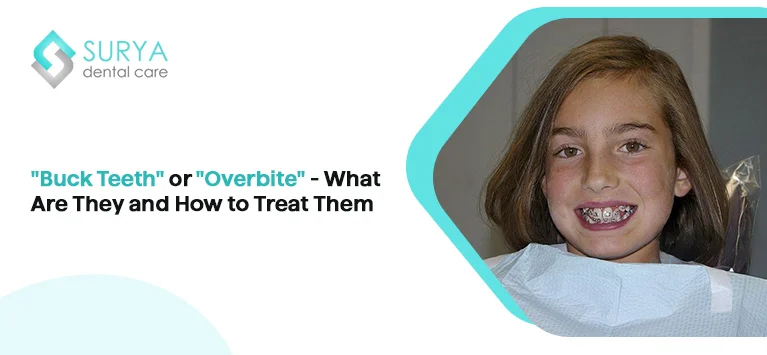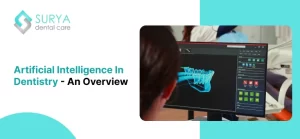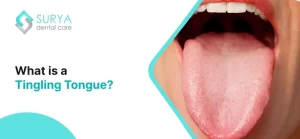Overbite is a condition where the upper teeth project outwards over the lower teeth for various reasons, such as misalignment of the upper or lower jaw and growth of upper teeth at different angles.
Bite or occlusion is used in dentistry to describe the alignment of upper and lower teeth when you close and open your mouth. Also, in dentistry, the term overbite or malocclusion is used to describe the misalignment of the upper teeth and lower teeth or upper and lower jaw.
Buck teeth is a dental condition that many people may or may not treat. But, dentists or orthodontists recommend treating buck teeth based on the severity as it may lead to severe health complications. Please read this blog post as it explains the causes and how to treat them safely.
Buck Teeth Causes
Factors like environment and genes cause buck teeth. Also, various common causes of buck teeth are explained in detail below.
Buck Teeth from thumb sucking
Thumb sucking in children is normal, and most of the children do not get problems as they stop finger sucking below the age of 5.
Suppose a child continues thumb-sucking after the growth of permanent teeth. That is when they continue thumb-sucking after the age of 5. It may cause problems in the alignment of teeth, and also, the pressure from sucking could cause the abnormal growth of permanent teeth.
Buck Teeth from the pacifier
When a child has the habit of using a pacifier even after the age of 2 or 3 has a higher chance of getting affected by buck teeth or any misaligned bite conditions.
The intensity of the sucking and constant sucking motion of a pacifier could cause bite problems in children who are using them. Also, the intensity is crucial in how fast the teeth get affected.
Buck Teeth from Tongue Thrusting
Tongue thrusting is a poor habit of swallowing. The tongue pressing forward or in between teeth during swallowing is called tongue thrusting. Tongue thrusting is regular in children when breastfed or bottle-fed. However, when this habit continues, it could cause abnormal bite conditions like overbite.
Genetics
Some people used to have an overbite condition genetically, as they are typically born with uneven jaw alignment. These conditions come genetically, so their relatives, siblings, and biological parents could have the same condition.
Missing Teeth or Crowded teeth
Even a single missing tooth could cause the misalignment of teeth, resulting in overbite or buck teeth. Likewise, crowded teeth are a condition with no space for the teeth to grow. This results in buck teeth as teeth may protrude and grow due to lack of space.
Health Risks Associated with Overbite
Without treatments, buck teeth may cause health risks based on severity. Although the overbite is not severe, the slight protrusion of front teeth may affect an individual’s self-esteem and well-being.
- Uneven bite
- Jaw Pain
- Difficulty with chewing food properly
- Head Pain due to pressure on the jaw joint
- Breathing Issues
- Teeth Grinding
- Speech impediment
Diagnosis of Buck Teeth
Dentists are the ones who can diagnose buck teeth. During the regular dental checkup, if your front teeth protrude 2 millimeters forward, you may have buck teeth. Dentists use the three most common ways to identify teeth alignments and check the bite conditions.
- Take X-rays: Dentists use X-rays to identify the internal structures of your teeth.
- Tongue Depressor: Pulling back the cheek while closing the mouth using a tongue depressor tool will help identify misalignments.
- Using mold: Taking the impression using the help of mold will help the dentist see your bite (How your teeth close and open).
Once the dentist identifies the presence of a condition called buck teeth during your dental checkup, they may recommend you to the orthodontist(an expert in treating overbite or malocclusions).
Treatment options for Buck Teeth
When overbite causes health problems, and the slight protruding of front teeth can disturb the appearance, you can visit your dentist or orthodontist. They identify the overbite’s severity and root cause and recommend suitable treatments.
Braces
Braces are used mostly by kids and early teenagers. But it can also help adults get rid of buck teeth, and it takes longer than kids and teenagers. The metal brackets and wires that are above the teeth will apply pressure to the teeth and give a straight smile.
Palate expanders
Palate expanders are removable devices used in kids and adults where teeth grow (Teeth Crowding). However, for most adults, tooth extraction is recommended.
Jaw Surgery
In most severe cases, jaw surgery is done to reposition the upper and lower jaws. This treatment is done only for adults and is not recommended for kids and teenagers.
Avoid treating buck teeth at home
Overbite or buck teeth is a condition caused by improper alignment that can not be treated at home. If you need to change the alignment of your teeth or jaw positions, consult a dentist or orthodontist.
If you have decided to live with buck teeth, then you need to follow good hygiene and use mouthguards during sleeping and in pressure situations. Go for a regular dental checkup to check for the severity of buck teeth and to get expert advice on living with buck teeth.
Takeaway
Don’t worry about buck teeth, as teeth may come in any size and shape. If you have concerns with the look and any health concerns caused by buck teeth, then treatment may be required from an orthodontist or dentist. Avoid treating buck teeth at home as it can cause problems to the roots inside.
FAQs
To fix buck teeth, various orthodontic treatments are available. Common options include braces, clear aligners like Invisalign, and in some cases, dental surgery. The choice of treatment depends on the severity of the overbite and individual patient needs.
Correcting buck teeth is possible through orthodontic treatment. Braces are the most common method, applying gradual pressure to align teeth properly. Clear aligners can also be effective for mild cases. In severe situations, surgical intervention may be necessary to realign the jaw and teeth.
Yes, buck teeth can be fixed with appropriate treatment. Options include braces, clear aligners, or surgery for severe cases. These methods can address both aesthetic concerns and functional issues, such as difficulty chewing or speaking, making it important to consult a dental professional for evaluation.
Buck teeth can affect speech, particularly if the overbite is significant. Individuals may experience difficulty pronouncing certain sounds, leading to speech impediments. Orthodontic treatment can improve both the appearance of the teeth and the clarity of speech, enhancing overall communication.
Buck teeth, or protruding front teeth, typically appear as the upper front teeth extending significantly over the lower front teeth. This condition can vary in severity, and its visual impact may differ from person to person.
"Bunny teeth" is a colloquial term for prominent front teeth, similar to buck teeth. This term is often used informally to describe the appearance of teeth that protrude noticeably, resembling the teeth of a rabbit. Like buck teeth, they can be corrected through orthodontic treatment if desired.
There are no effective home remedies to fix buck teeth. While some suggest tongue exercises or using retainers, these methods do not address the underlying alignment issues. Professional orthodontic treatment is necessary to safely and effectively correct buck teeth and avoid potential damage to the teeth and jaw.







